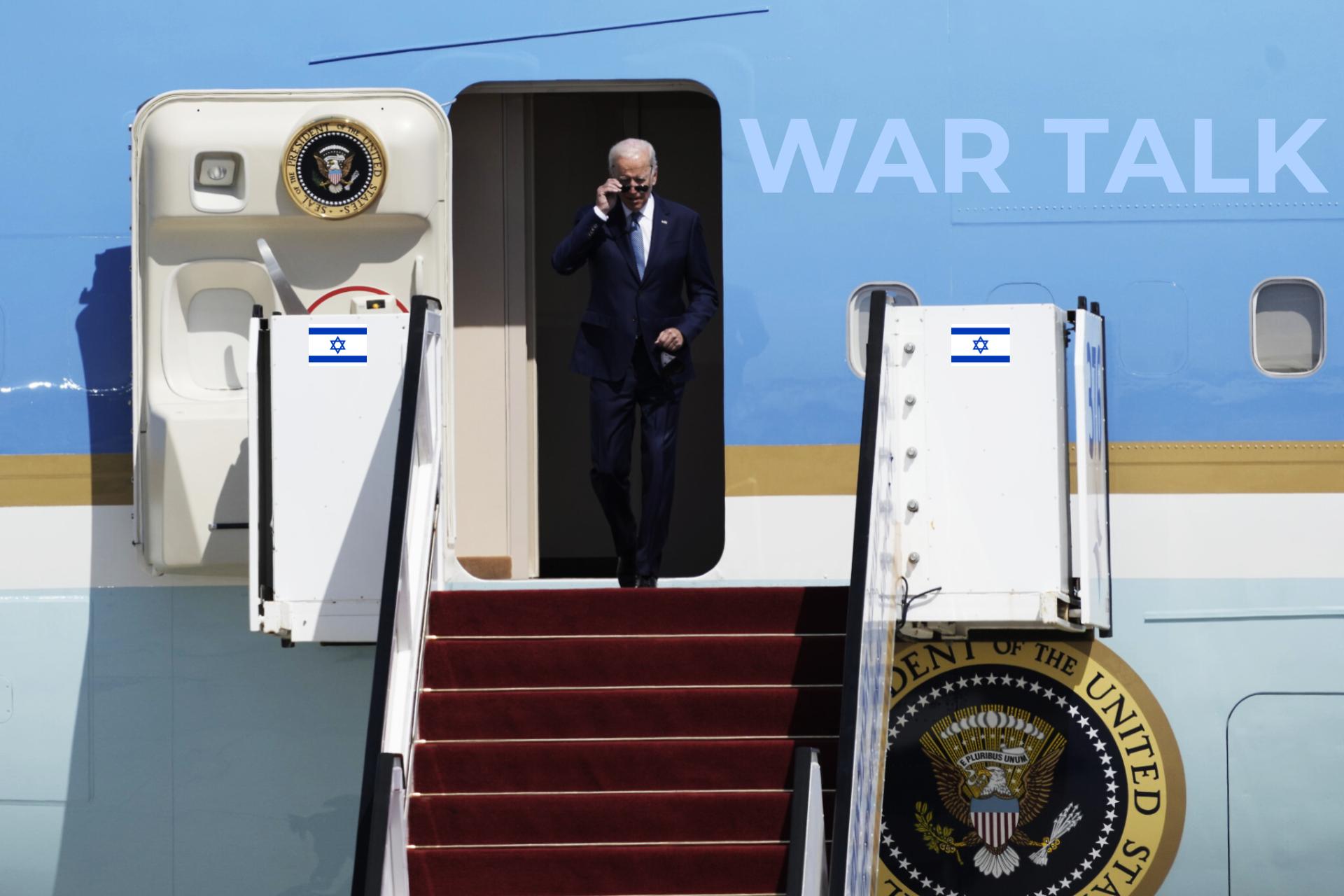HLS.Today – President joseph r. biden, jr. will travel to israel on wednesday, october 18, to demonstrate his steadfast support for israel in the face of hamas’s brutal terrorist attack and to consult on next steps.
president biden will then travel to amman, jordan, where he will meet with his majesty king abdullah, egyptian president sisi, and palestinian authority president mahmoud abbas. he will reiterate that hamas does not stand for the palestinian people’s right to dignity and self-determination and discuss the humanitarian needs of civilians in gaza.
from israel, thank you very much for starting off our coverage at this hour. thank you. >> and joining us now is ben rhodes, former deputy national security adviser for president obama. he is an msnbc political analyst. ben, it seems likely that israel will not launch a land invasion, or ground invasion of gaza before president biden leaves israel.
>> yes, lawrence. i can’t imagine that israel would do that, both because of the potential risk of escalation while president biden is there. and also, just because i think the purpose of this visit is to have a consultation, a full, robust, comprehensive consultation between president biden and the israeli government before they launch that invasion. so, i think that this indicates that the timeline for that ground invasion is likely moving a bit to the right here. >> in the less than three minutes, secretary blinken laid out the agenda for president biden when he comes to israel. he easily described the single most important meeting by a president of the united states in israel that has ever occurred.
>> yes, not even close, lawrence. i mean, this is absolutely unprecedented. obviously, what’s happened in israel’s unprecedented. the risk of regional escalation is unprecedented. and the idea of a president being in that kind of circumstance, where there is literal danger in terms of the rockets that are continue to come at tel aviv, but also, there whisks about not knowing where exactly this is going. what is clear is that secretary blinken was on that trip. he went to every major partner, partner in the region, after consulting with israel. and clearly, what he determined is there are a number of issues where it’s absolutely central to the u.s. and israel, they’re on the same page. how do we prevent regional escalation?
what is the messaging that has to be done to iran, and groups like hezbollah, to prevent escalation? how can we ensure a sufficient humanitarian component to end the israeli operation in gaza that does not set the region on fire? and i’m sure that’s the message that secretary blinken was getting from those air partners, that we have to take every step possible to both have an israeli operation, and also mitigates the arm to palestinian civilians. clearly, secretary blinken took all those messages from arab leaders back to israel, compared notes, and saw whether or not the time was right for president biden to step in like this. and the fact that he was meeting with seven hours with prime minister netanyahu indicate this is real substance, right? this wasn’t window dressing, the secretary meeting with a foreign leader to the presidents visit. they were really negotiating the agenda, the deliverables, the announcements that will come from president biden as well during that visit.
>> yeah, at the washington post is reporting, u.s. officials waited to announce president biden’s traveled to israel until they received commitments from israeli prime minister benjamin netanyahu on a humanitarian package monday night, according to two u.s. officials familiar with the discussions. and then, that’s all about that seven-hour meeting that secretary blinken was in.
>> that’s right. and you heard even in his remarks, tony’s remarks, i think they clearly indicated what the back and forth and the points of tension are on this. on the one hand, there is an overwhelming imperative to address the humanitarian crisis in gaza, and that is growing more acute. and then, again, it really was the concern that tony blinken heard from all the different arab leaders, and obviously from leaders around the world. on the other hand, you heard in his messaging what the israelis are concerned about, which is that we provide a humanitarian corridor into gaza. we start shipping eight into gaza. if we create safe zones in gaza, then hamas we manipulate that, that they will dispute disrupt the aid, try to get their hands on things that might be used for military purposes as well. so, i think you heard, even though you heard those remarks from tony blinken, we heard exactly what was discussed in that meeting with prime minister netanyahu, which is that u.s. wanting to make sure that there was a commitment to humanitarian effort to alleviate the situation in gaza. but israel wanting to hear from the united states that we understand that there is a risk that hamas could try to take advantage of that. and that clearly was a big part of the discussion in that meeting that tony blinken had in israel.
>> there is a lesson, i would say, in the last 24 hours for people watching this coverage across television networks, with the president last night on 60 minutes, he was asked, pressed about humanitarian aid in gaza. and he was minimally forthcoming. he certainly said that it is necessary, we have to figure out something. the team is working on something. and of course, much more was going on than what was indicated in his answers 24 hours ago. 24 hours later, you see a hint of how much more. and of course, that means whatever we know tonight, there is even more going on underneath that.
>> that’s exactly right, lawrence. i have been in situations like this. this one is perhaps more acute. but what has been going on is constant communication between the secretary of defense, the pentagon, and the idf, between i’m sure, the nsc, national security adviser, tony sullivan and his counterparts. tony blinken did a shuttle of diplomacy around the region. and really, the position of united states has meant — president biden has put himself in. he saw the trauma that this attack imposed on israel, they were thick nature of it. and their imperative to respond. he wrapped his arms around israel, quite literally, with his initial messaging. but then, obviously, they’re also looking to see there’s risk here. there is risk that this military operation goes forward in haste, that it could prompt a regional escalation. as we’ve talked about, hezbollah coming in, the west bank exploding, air public opinion exploding. there is risk, obviously, to the civilians in gaza. clearly, what the united states has been trying to do, saying to israel, let’s take just a moment here, and think through how can we manage this operation? we know you are going to undertake that in ways that mitigate that risk. but they’re more likely to prevent regional escalation. we, the united states, we’ll show you our commitment to our security, not just through our messaging, but by two aircraft carrier groups that are being sent to this mission to send a message to iran to stay out of this. at the same time, though, we need to see something from israel that indicates that they understand that the world is watching the humans are in crisis in gaza as well. it is incredibly complicated, but clearly, the administration once that messaging done in private, when it comes to the nature of the content crisis and how to alleviate that. the only tip of the hand, president biden does not want to see a full reoccupation of gaza. but underneath that, in order for his visit to happen, because it is incredibly consequential and a risky step, lawrence. they are leaning into this thing. there was this, you have ownership of whatever happens next. but the reward is you can impact and you can prevent that regional escalation. and you might be able to alleviate the humanitarian crisis. and clearly, joe biden is determined that it’s better to lean in and try to have a new patio and dick summers about where this thing might go, then to step back.
>> president biden, he always seems to have his eye on the risk, and of course the possible reward but then also. and perhaps more than others have in the past in israel, what he sees as his duty.
>> yes. you know, it’s both something people into would’ve too. and i don’t know how many times i was in a room with president biden when he would tell the story about going there in the 70s for the first time and meeting with prime minister gould mayer of israel, and telling him that the reason that we’re gonna be here is that we don’t have anywhere else to go. it’s something he feels intuitively. the other thing that i think is really important, lawrence, psychologically, i think, he understands that israelis feel vulnerable right now. they feel isolated. it is always the case. there are few places on earth where people are more appreciative of visits, of people stepping feet on the ground than israel. i can’t even imagine what the impact of this visit will be on the psychology of israel, given how vulnerable people are feeling right now. they are seeing — the united states government literally is charging plants, planes to get americans out. and yet, there is the president of the red states flying in. that is an incredibly powerful thing. i don’t think we even can grasp how much this will even mean. but there’s a lot to be done. this is substantive meeting as well.
HLS.Today DHS.GOV







